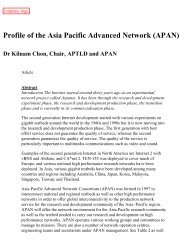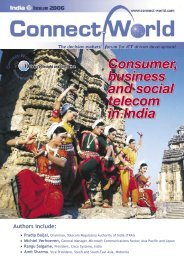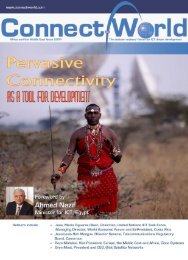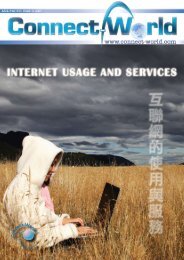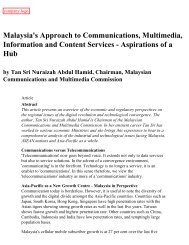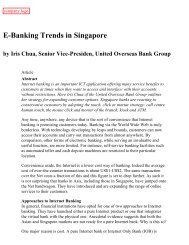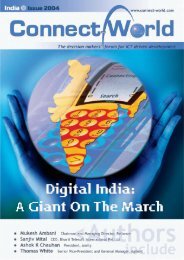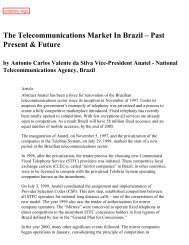Contents - Connect-World
Contents - Connect-World
Contents - Connect-World
Create successful ePaper yourself
Turn your PDF publications into a flip-book with our unique Google optimized e-Paper software.
Business Development<br />
Asian tigers in a global marketTechnology implications<br />
for smaller organisations<br />
by Derek Williams, Executive Vice President, Oracle Corporation, Asia Pacific Division<br />
Most large enterprises and governments across Asia Pacific have embraced Internetbased<br />
business processes and application. Today, as the first wave of e-business, large<br />
organisations are starting to reap the benefits. Behind these large organisations, though,<br />
is a network of small and mid-size enterprises, SMEs, which dominates the Asia Pacific<br />
business landscape and is the backbone of the value chain for global commerce. Now,<br />
Asia Pacifics smaller organisations can become competitive in the global value chain<br />
through strategic adoption of IT.<br />
Derek Williams is Executive Vice-President of Oracle Corporation, Asia Pacific and Japan. He is a member<br />
of Oracle’s Executive Management Committee and a director for Oracle Japan. Mr Williams formerly<br />
was Senior Vice President of Oracle Asia Pacific Division and served as regional director for<br />
strategic accounts before moving to head the newly created Asia Pacific Division.<br />
In recognition of his contribution to the development of the Chinese software industry, Mr Williams was<br />
awarded an Honorary Professorship from Shanghai Textile University in 1995.<br />
The global marketplace we operate in<br />
today is becoming smaller as a result<br />
of greater visibility and real-time connectivity<br />
via the Internet and<br />
advanced mobile communications.<br />
This new, more transparent world has<br />
increased competitive pressure on<br />
organisations and it is the small and<br />
mid-sized businesses, which often feel<br />
the greatest brunt.<br />
Supported by improved logistics, the<br />
connected marketplace makes smaller<br />
enterprises more vulnerable to<br />
replacement in their value chain.<br />
Increasing global competition in the<br />
worlds economy means companies<br />
are searching for ways to both differentiate<br />
themselves through new products<br />
and exemplary customer service<br />
whilst, at the same time, improving<br />
margins through cost cutting to meet<br />
investor commitments.<br />
Furthermore, as customers and suppliers<br />
adopt more advanced technologies,<br />
they force these standards on<br />
their smaller business partners.<br />
Unfortunately, the ability of smaller<br />
enterprises to address these challenges<br />
is constrained by the fact that<br />
they generally are not masters of their<br />
own destinies. They play the role of<br />
cog within value chains defined by the<br />
larger organisations. It is the larger<br />
enterprises that traditionally set the<br />
rules for business practices, performance<br />
standards and communication.<br />
For example, trading partners are<br />
beginning to demand that more business<br />
processes be conducted electronically.<br />
This trend affects smaller<br />
enterprises more so than larger companies,<br />
because their survival and success<br />
may depend on establishing links<br />
to partners, customers and suppliers.<br />
Smaller enterprises, therefore, must<br />
keep up or face replacement by a more<br />
capable player.<br />
Asia Pacifics smaller companies also<br />
face many other challenges. The<br />
amount of information exchanged<br />
with other players across the supply<br />
chain is increasing dramatically.<br />
Collaboration between companies will<br />
also increase as they outsource both<br />
functions and work to multiple companies<br />
across extended supply chains<br />
to optimise operations.<br />
Data broadcasting is also on the rise.<br />
New technologies like RFID (Radio<br />
Frequency Identification) — miniature<br />
devices that can be implanted into any<br />
product to broadcast information anytime,<br />
anywhere—will double or triple<br />
the data circulating in the worldwide<br />
economy.<br />
This data must be managed, synthesised<br />
and ultimately converted into<br />
useful, actionable information by<br />
companies of all sizes. Companies<br />
information systems must be able to<br />
handle such data volumes.<br />
Smaller organisations also face many<br />
of the same challenges that large<br />
enterprises deal with. A key area is<br />
Corporate Governance.<br />
Across the globe, new regulations<br />
demand more transparency and<br />
process certification, as well as greater<br />
29



